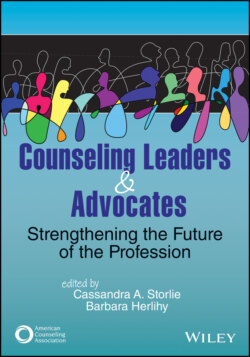Читать книгу Counseling Leaders and Advocates - Группа авторов - Страница 40
Additional Considerations for Culturally Responsive Leadership Practices in Counseling
ОглавлениеAs we look to the future in strengthening our profession in leadership and advocacy, contemplate the following considerations as you move forward in your culturally responsive leadership journey:
Systems surround us in all aspects of our lives. Remember, it’s not just the system, it’s multiple systems, and you, as a culturally being, are a part of those systems.As a culturally responsive counseling leader, you are responsible for taking deliberate action with and on behalf of those who do not have a seat at the table. How can you get involved in state, regional, national, and international professional associations to continue to combat systemic injustices that permeate our society? Where does your voice need to be heard?
How can we best create a pipeline for diversely represented counseling leadership?As a profession, we know that many of our ACA counseling divisions have focused on improving diversity among their leadership (e.g., Association for Counselor Education and Supervision, AMCD, CSJ, and the Society for Sexual, Affectional, Intersex and Gender Expansive Identities). We further recognize the push for diversity and inclusion in other counseling organizations such as CACREP and CSI. We need to continue to strive for and increase the diversity in our counseling leadership at every level and consider how executive boards engage and address diversity concerns in their practice. It is essential to increase the representation of voices that are often not acknowledged while simultaneously avoiding tokenism.
How can we improve our selection of speakers, resources, and content within our schools, agencies, and work environments to include diverse individuals and to have the crucial conversations necessary for growth and development?It is not enough to have one (or maybe two) multicultural classes in your counseling program curriculum. As professionals in training and in the field, we need to think strategically about how to improve our selection of guest speakers who can offer perspectives and worldviews that differ from our own. In addition, we need to be purposeful and intentional with the resources and content we explore with our students, supervisees, and colleagues and be prepared to have challenging conversations that move beyond cultural competence to action and evaluation.
• • •
We hope this chapter spoke to you. Part II of this book highlights some exceptional culturally responsive counseling leaders and advocates whose work is illuminated in these narratives. You will see the recognition of their privilege and how they used their privilege to support marginalized and oppressed people. Each of these profiles provides insights into how to become a culturally responsive counseling leader. As you read the next chapter and move toward Part II, remember this:
You are a light. You are the light.Never let anyone—any person or any force—dampen, dim or diminish your light.Study the path of others to make your way easier and more abundant.
—Rep. John Lewis
